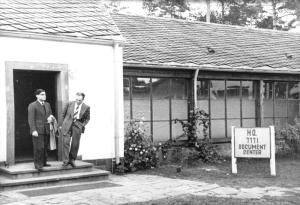After the war, when Germany went into denial (which lasted quite a few years, if  not decades), many people insisted they had never been in the Nazi Party. Their papers, they thought, were destroyed, or unavailable in the eastern lands then controlled by the Soviets. Impossible to confirm their claim, right?
not decades), many people insisted they had never been in the Nazi Party. Their papers, they thought, were destroyed, or unavailable in the eastern lands then controlled by the Soviets. Impossible to confirm their claim, right?
One German’s gutsy gamble in the last days of the war spoiled this game.
His name was Hans Huber, manager of a paper mill in Munich. On April 15, 1945, Hans had a visitor who informed him a large amount of paper would arrive soon that must be destroyed — immediately.
Three days later, the trucks began to arrive. Twenty trucks per day, nine days long. Each contained mounds (or rolls) of paper.
But not just any old paper. The central membership register of the Nazi Party.
Every party member from the NSDAP’s founding had a duplicate card stuck in the register and stored in steel cabinets in Munich’s Arcissstraße. Everyone including Hitler.
But there was more. The party applications themselves, with personal information, photos,and signatures also fell into Huber’s hands. SS documents too, handwritten notes from Himmler, Gestapo papers. In all, he had 50 tons of paper that could incriminate big and small Nazis alike.
When he realized what he had, Huber – no Nazi – decided to bluff. He delayed pulping the paper. He claimed he didn’t have enough coal, or his machines broke down because they didn’t have spare parts. Two weeks later, the Americans took Munich.
You’d think they would have jumped on such a treasure. But at first, the army was looking for real treasure — gold and art — not paper. Huber said he approached the Americans in May 1945, but no chance. They didn’t want paper.
In the fall, he finally came across an army archivist who took a look at the paper. “Any damn idiot” could see how important it was, Sargent B. Child told colleagues later.
But even then, the Nazi documents weren’t a sensation. They traveled to a warehouse near Kassel where the US military government collected and cataloged material found across Germany. As focus shifted to war crimes trials, the Allies saw the untold value of Huber’s paper. Right there was the documentary proof of membership in the NSDAP, along with other papers that could be used in war crimes trials.
In January 1946, 15 train loads of papers traveled to their final home — the Berlin Document Center. In his memoir, George Clare described the center that year.
I had expected to find a big barracks of a place but what I actually saw when I arrived at Wasserkäfersteig was a largish suburban villa, like so many in Zehlendorf. However, the high barbed-wire double-fence round the periphery of its extensive grounds, the floodlights and the armed, steel-helmeted sentries told me I had come to the right spot.
The Americans controlled the archive until 1994, and it’s now a part of the German Bundesarchiv.
And no one who was ever in the German Nazi Party could deny it and get away with it.
*Photo: Bundesarchiv, Bild 183-M1129-300 / Donath, Otto / CC-BY-SA [CC BY-SA 3.0 de (http://creativecommons.org/licenses/by-sa/3.0/de/deed.en)%5D, via Wikimedia Commons


